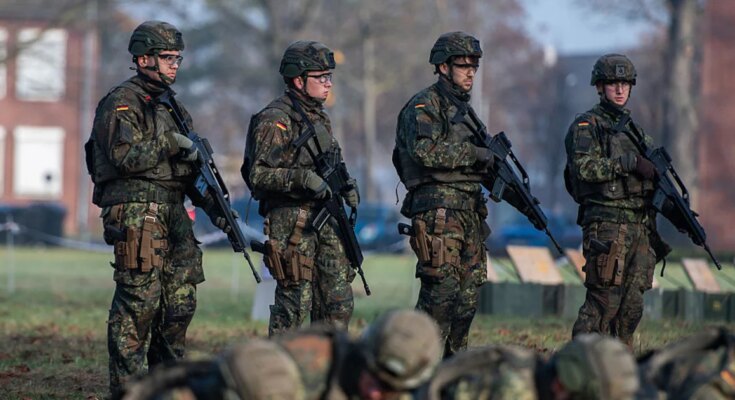Some produce uniforms rather than outdoor clothing, others build field kitchens rather than small kitchens. German companies everywhere are checking supply chains, setting up emergency camps and drawing up personnel downtime plans. The economy is preparing for a defense event.
For a long time, this was an off-limits board meeting topic. But now, entrepreneurs, managers and consultants are on the offensive – mainly because they see an advantage for themselves over the competition: The German economy was preparing for war. It switches from peaceful mode to a permanent state of readiness.
Defcon 2 This is what the US military calls such a situation and means high alert. This is no longer just about the defense sector, but about the preparations that everyone makes in the event of an attack on the supply chain, a shortage of personnel in companies because soldiers have to go into the field, and production stops because infrastructure is damaged. Many civilian companies are now creating production and delivery buffers so they can continue operating in the event of a crisis.
Preparation for emergencies
They are all working on what the Bundeswehr calls a “cold start file”. Regulation “ARD-2641/1a” applies to the Bundeswehr from 1 August 2024 and is entitled “Cold Start Act”. This is a leaflet to support and raise awareness among military and civilian members of the Bundeswehr on the topic of “creating personal operational readiness” – and that is what the companies are now aiming to achieve.
There are also those who carry out conversions: from civilian products to products that can be used for military purposes and will most likely be in demand in the event of war. Prime example: Munich startup Circus, previously known for its autonomous kitchen robots in canteens, announced a military version of its system.
Circus boss Nikolas Bullwinkel said: “We’re not just automating the feeding of troops – we’re also redefining how critical missions are supplied, supported and sustained.” “CA-M”, an AI-controlled robotic kitchen installed inside a container, should be able to operate in extreme conditions. Circus not only wants to supply supermarkets, but also provide logistics in war and crisis areas. This example shows that the boundaries between civilian production and the war economy were increasingly blurred.
Contingency plans are underway
The consulting union is also preparing for this: Henrik Ahlers, head of consulting firm EY in Germany, announced this week that he will significantly strengthen the defense sector at the company. That’s what he was interested in: developing contingency plans, securing production, bringing investors, companies, and city and state representatives to the table to prepare if war broke out. “The security policy situation requires strengthening defense capabilities. New technologies in the field of AI and cybersecurity are very relevant,” said Ahlers.
These changes are accompanied by political support: In its “European Industrial Defense” strategy, the European Commission calls for an industrial technological base more geared towards military needs, shorter and safer supply chains and a “culture of preparedness”.
Commission Chair Ursula von der Leyen said: “The threat of war is unlikely, but it is not impossible. We need to buy more European products. Because that means strengthening Europe’s defense technology and industrial base.” The message is clear: It’s not just tanks and missiles that count – it’s every machine, every robot, every software component that can be used in the event of a crisis.
The company makes plans for the future
Therefore, mid-sized companies and corporations are also working on their cold start strategies:
- Traditional company Schoffel from Schwabmünchen, previously the epitome of Alpine leisure culture, sews uniforms for the security forces. In just a few years, government and operational matters will become as important as the sports sector. CEO Jakob Schöffel calls this “a strategic expansion of our core.” The company must first learn how Bundeswehr tenders work – and then change its position: permanent availability of materials, proven safety standards, production that can be scaled up quickly.
- Kärcher FuturetechWinnenden’s cleaning equipment manufacturing subsidiary, now supplies complete field camp systems, drinking water treatment and ABC decontamination equipment to the Bundeswehr. The troops already have 400 field kitchens, as well as supplies for decontamination modules – this is not a side job, this is series production. Medium-sized companies have secured their supply chains for this: domestic spare parts warehouses, parallel suppliers, standardization of components. When other industries come to a standstill, Kärcher can deliver immediately. Cold start.
- The maintenance giant now increasingly appears to be shifting Lufthansa Technology. The company, which for decades only overhauled civilian jets, is now equipping Bundeswehr government planes, installing self-protection systems, avionics and communications modules. Knowledge from civil aviation flows directly into safety-relevant projects. For the Hamburg-based company, this is not a breakthrough, but rather an expansion – its business area is called “Defense Solutions” and continues to grow.
- And even the trains were running. DB Cargopreviously responsible for cars and containers, now provides flat cars and the entire route for NATO deployment exercises. The contract with the Bundeswehr ensures that in the event of a crisis, hundreds of carriages and train drivers are available within hours. Civilian rail freight transport is therefore part of military logistics planning – including crisis schedules, reserve trains and priority routes. This is a war economy working as planned, unobtrusive but systemically relevant.
When the front calls
What is clear is that companies are developing action plans for when normal processes don’t work. The term “war” does not appear officially everywhere, but the logic is clear: if the normal world stops, production cannot stop either. On Siemens For example, the innocuous marketing title “Industries of the Future” is also about preparing for emergencies. Personnel must be secured: If employees enter the reserve or even go to the front, operations must continue. Companies set up internal backup teams and rely on digitalization and automation to ensure machines keep running even if staff are not available. Retraining returning workers and focusing on part-time workers is part of the cold start plan.
Everyone is affected
The result: If businesses look not only at sales, but also at “If things were different”, then the business model will change: from globally cheap and timely to regionally safe and mobile. The turning point had arrived, and this not only affected the arms industry, but also normal factories such as those owned by Schöffel, Kärcher and Co. Defense Minister Boris Pistorius put it this way: “We must be ready for war in 2029… We must be resilient and able to evolve.” And Carsten Breuer, Inspector General of the Bundeswehr, said: “We want to win because we have to win.” He emphasized that this attitude encompasses “society, politics and economics”.


